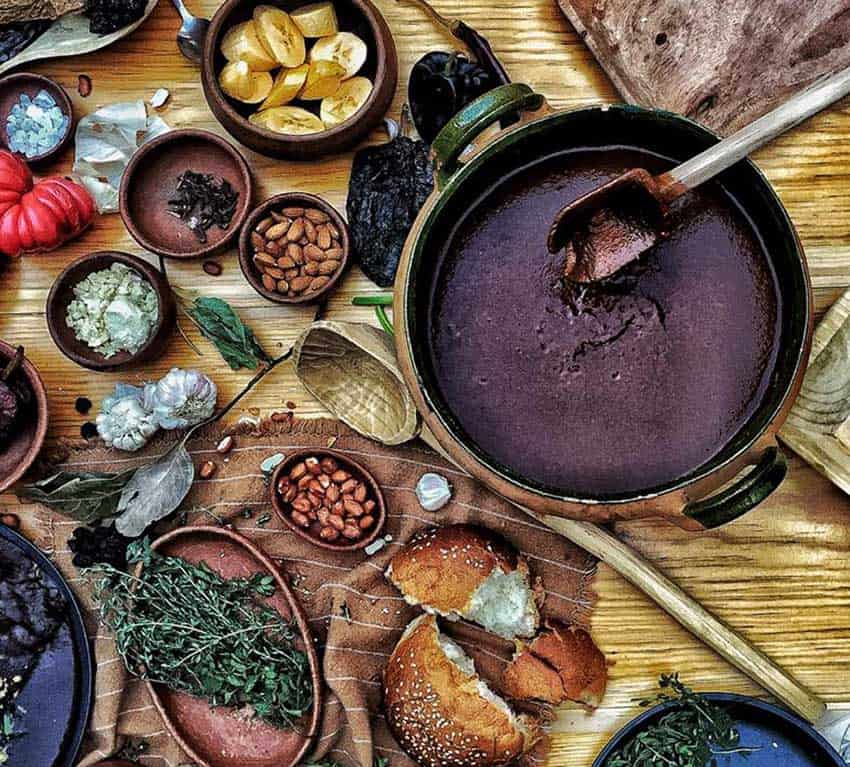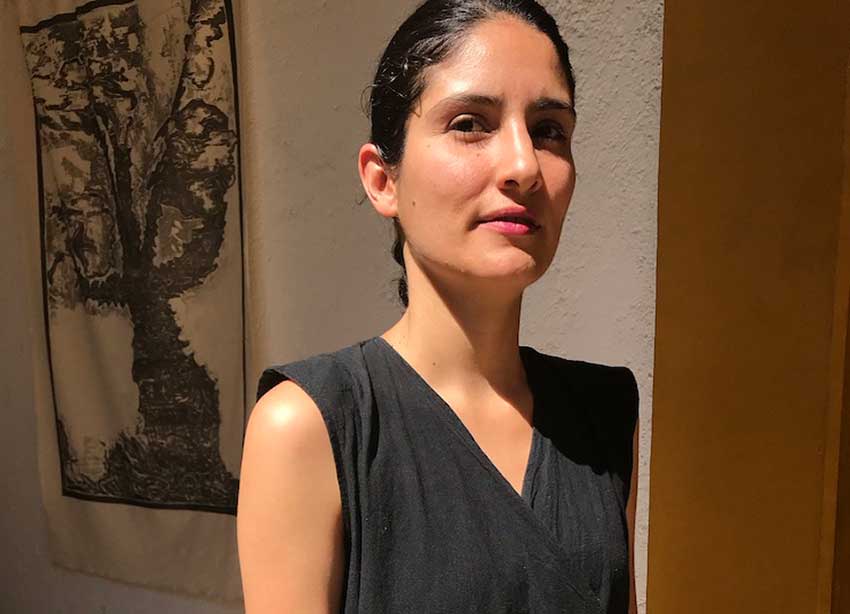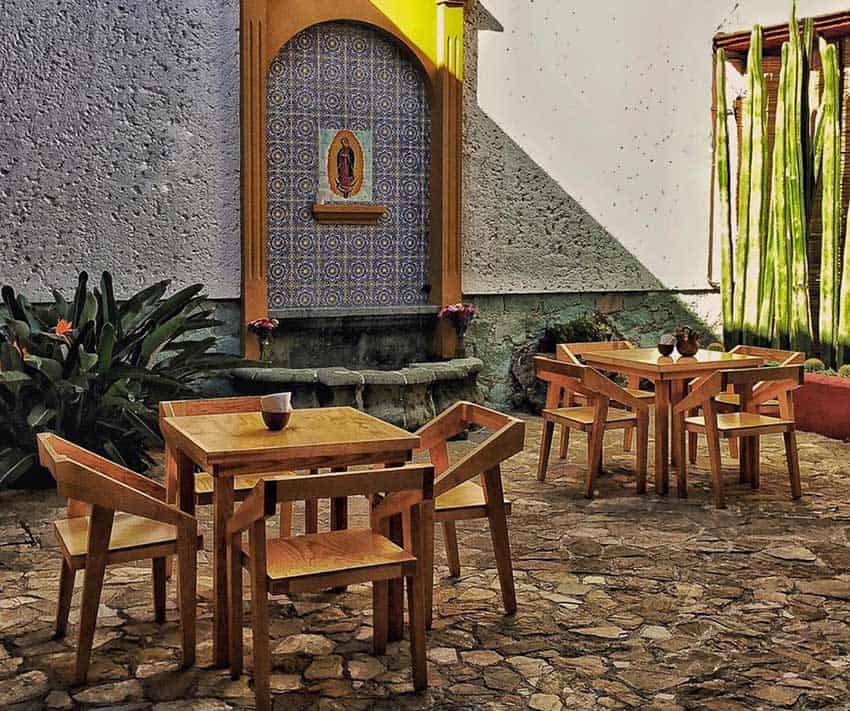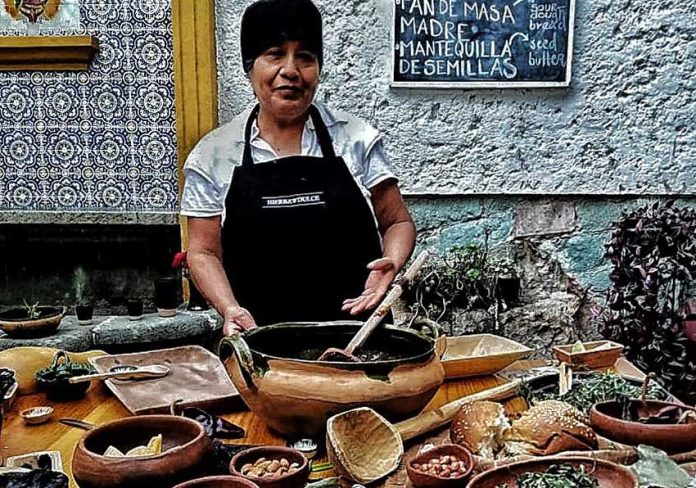Removing competition, capitalism and hierarchy from a restaurant may seem like an impossible feat. But Hierba Dulce, a feminist cafe and meeting space in Oaxaca’s city center, proudly asserts that it does just that, and with “curative” food to boot.
With little more than a year in operation, the plant-based restaurant offers accessible prices for de-industrialized foods. There is no oil, sugar, salt or animal byproducts used in the cuisine, and diners likely won’t know the difference.
“We don’t use any processed materials in the kitchen, not one,” said Mariana Favela, co-director of Hierba Dulce and its sister project, Pochote Press, a magazine based on feminism, social movements, political philosophy and aesthetics.
The letterpress and risograph magazine was originally based in the same space as Hierba Dulce, before the café became wildly popular.
“The idea was that we could have a public space to meet up for cultural and academic events, book presentations,” Favela said. “Thinking that ultimately a restaurant is a really intimate thing because it opens a physical space for you to share with people, including food, which is a form of communication, a language.

“We wanted to see to what point we could really materialize healthy and abundant food, breaking the myth that healthy food, now more than ever, is considered a luxury. We see it as a right. And we still have the goal of feeding the community because there’s a really strong gentrification in Oaxaca right now.”
Hierba Dulce gives special attention to the woman-centered gastronomic knowledge that has been in many cases dispossessed in the wake of cultural obsessions with mostly male chefs on the world stage. And even in Oaxaca, with a proliferation of restaurants considered “gourmet” that seems to overtake the city’s culinary scene.
“Historically the kitchens are the schools of the village, where they maintain knowledge, recipes and culinary traditions,” Favela said. “These things can’t even be written down because it’s something you have to learn with your hands, with your eyes, with experience and practice. We feminists have been very critical of these superstar chefs because they say they aren’t machistas because they have a mom or they love their sister. The chefs recognize the knowledge their mothers have imparted upon them, but it’s not the mothers who are on the magazine covers, or in charge of these restaurants.”
This aim to recuperate the kitchen as a feminine space, in the manner that they are places to learn and share, has led to full authority being given to Hierba Dulce’s Georgina Cruz, who has five decades of culinary experience at prominent Oaxacan restaurants such as Casa Oaxaca where she served as the mole specialist. She is also a guest instructor at Escuela de Gastronomía Mexicana in Mexico City.
“What we offered is this restaurant, even though we founded it we wanted to give it to her; she is the boss and she is the one who makes the orders,” Favela said. “We see this as a school, as a way to avoid losing the recipes, and the ingredients that go into them.
“It’s a very complicated thing to know the recipes in the traditional moles that they used to prepare. It takes 30 years to be able to prepare a good mole from scratch to finish. A big issue we had when we decided to program ourselves as de-industrialized was that Georgina had to modify some of the recipes because in Mexican cuisine they use a lot of oils and byproducts of colonial animals like pig fat.

“So there was a combination of investigation and asking, mostly to the producing families, how do they keep cooking without using those industrialized ingredients? We are looking back further to the pre-Columbian past of this region, and the products that are part of that cuisine.”
Everything is cooked over a slow fire, including bread and beans that require nearly 24 hours from the start of the process to the time they are ready for consumption. This, coupled with the fact that Hierba Dulce has made a commitment to keep prices accessible for the producers of the food itself, didn’t sound like a very solid business plan in the beginning.
But Favela said that wasn’t the idea. The goal was that everything would be made in house from scratch and that the space would invite conversations on responsible consumerism.
“It’s a balance, keeping the prices as low as possible without affecting the economic stability of the people who work here,” Favela said, adding that recently an older foreign couple suggested that Hierba Dulce put a higher price tag on its offerings.
“It’s an example of how this space is for education, not just in the kitchen, but for Mexican and international tourists and for people who don’t know our culinary traditions or how we interpret our gastronomy. So that we can teach people to value things beyond money. And this I think has been one of the most difficult things: breaking the idea that if something is good, it has to be expensive, which is something that is very complicated to express in our commodified societies.”
Menu items range in price from 40 pesos for appetizers — such as a generous portion of sourdough bread slices topped with heirloom tomatoes and house-made hummus, to a yellow mole with mushrooms for 80 pesos and handmade enchiladas filled with purple potatoes and quintonil (a Mexican herb) at 60 pesos. Oaxacan coffee, herbal infusions and mezcal also are available.

Being responsible toward producers, honoring traditional recipes and traditional cooks — who are most often women — is a major focus of Hierba Dulce’s work.
“It’s part of our process of decolonization; preserving this knowledge that doesn’t fit into books,” Favela said. “These traditional cooks deserve recognition and also freedom. For example our mezcal bar, it’s a bar of women mezcal producers because while women have always been present in the production of mezcal, they have been invisibilized . . . . recently we had a marinade of mole and mezcal that was a collaboration between Georgina Cruz and Graciela Angeles from Mezcal Real Minero; and we have collaborated with the master distiller Berta Vazquéz.
“It’s a project that just guided itself in a certain sense. These are the mezcals that we like best, and we want this place to be an open platform for women who have marvellous projects in their own aspects.”
Having a truly just kitchen implies detaching the typical restaurant hierarchy from its food, and also being mindful of where all produce comes from. The restaurant is committed to non-violence, from within its walls to the local communities where their products are sourced.
“All of our avocados are criollo varieties, we don’t use the Hass variety because it’s a type of produce that is controlled by the narcos,” Favela said.
“As consumers, we have to be responsible about what kind of businesses we are supporting with our habits. There’s an avocado boom right now, and this is something that people should know, that they are financing drug traffickers and other groups that force people to work in either drug or avocado farms. We are very privileged to live in a place with so many varieties of criollo avocados, and they all have completely different flavors.”
Carlo Petrini, founder of the international slow food movement, recently visited Hierba Dulce and the staff was delighted to have him; overjoyed to be chosen over other restaurants that undoubtedly extended offers to him while he was in town.
But Favela says the restaurant changed nothing despite having such a high-profile guest. The food is made for anyone and every day, it is the same quality, she said.
“If traveling serves for something, it’s not to extend yourself over others,” Favela said. “It’s not to prey upon the place you arrive to. It’s for you to learn something from the places that you visit. And Oaxaca has a lovely lesson for many other places: that the most valuable things often don’t cost a lot of money. And we have to learn to care for them, because if we don’t care for them, they are going to run out.
“This applies to mezcal, agaves in general, varieties of corn, animals, etc. It’s a predatory thing, this style of pushing local gastronomy to do things that the international scene believes are luxurious. Such as incorporating deer, which are sacred animals in Mesoamerica, and using these animals every day on their menu. It’s a type of cultural dispossession, it’s a lack of knowledge of our own story, and further, it’s environmentally something that doesn’t show people that we are at a critical moment as modern societies, and that we have to start to recognize other forms of consumerism.”
“We like to say that we welcome everyone with open arms, but that we cook for Oaxaca.”
Megan Frye is a writer, photographer and translator living in Mexico City. She has a history of newsroom journalism as well as non-profit administration and has been published by several international publications.
